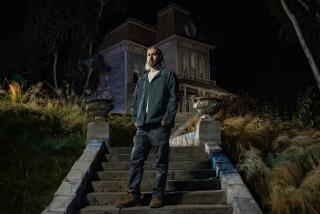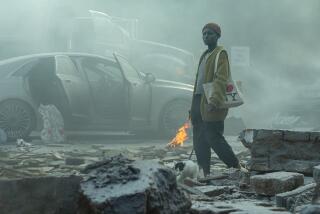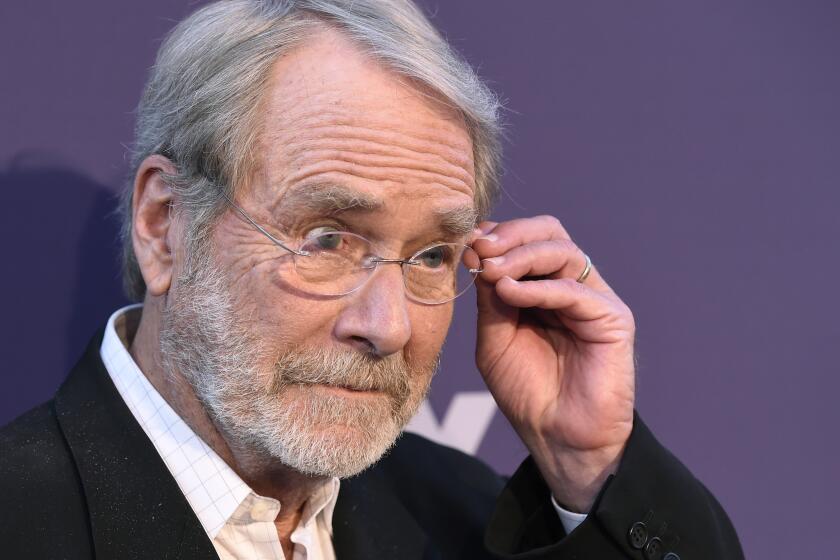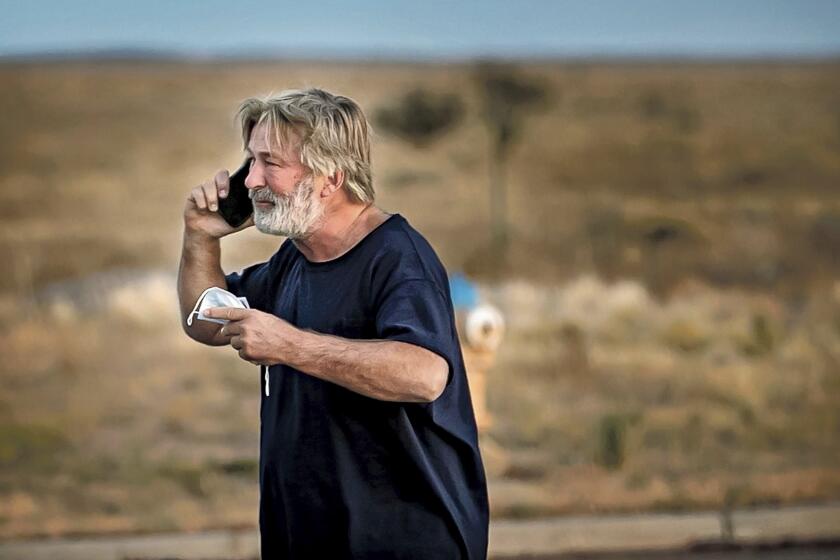This producer’s story is rated: parental guidance
“In this town, your character is measured by how you handle defeat, not success,” Art Linson told me the other day, sitting at lunch, fiddling with the menu, cracking jokes about Bulgaria, basically doing anything to take his mind off the fact that his new movie, “Lords of Dogtown,” has, despite a raft of favorable reviews, been taking an ignominious dive.
Having been a producer for 30 years, Linson has suffered this kind of box office indigestion before. He’s been in the penthouse, having produced “The Untouchables” and “Heat” and “Fast Times at Ridgemont High.” But he’s been in the doghouse too, having made stinkers like “We’re No Angels” and “Sunset Strip.” He also made “Fight Club,” which impressed the critics but gave a lot of other people a massive headache. Every movie is a struggle, especially a project like “Dogtown,” which Linson produced, from start to finish, with his son John Linson.
“I’ve been through too many movies where by Saturday night, I’m up on top of the building, ready to jump off,” he says. “If Sony made any mistake with ‘Dogtown,’ it’s that they loved the movie too much. We were thrilled that they wanted to put it out in the summer, but it needed its own weekend without so many huge movies around. When [our market researchers] would ask kids about ‘Dogtown,’ they didn’t even know what we were talking about.”
Linson sighs. The last few years have been rough. The 63-year-old producer still makes a movie nearly every year, but the hits have been few and far between. “Let’s order lunch,” he says. “They say if you eat something really good, it helps dampen the pain.”
Around Father’s Day each year, I spend time with a pair of father-son industry insiders. This year’s subjects are Art and John Linson, one of the industry’s rare father-son producer teams, who offer their generational perspectives on family ties and the unending struggle to get movies made. As is evident from the experience of “Dogtown,” the hosannas are often outweighed by the heartbreak.
“I remember the house being a little moody growing up,” says John, 35. “When I was talking to my mom the other day about [the failure of] ‘Dogtown,’ she reminded me that we went through this, year after year. I remember my dad building model airplanes and taking saxophone lessons -- he always found a way to bob and weave through times like this.”
On the surface the two men seem to be quite different. John rides a motorcycle; Art drives a black Mercedes. John never went to college; Art graduated from law school. But they are both outsiders with an affinity for mavericks. John is a Suicidal Tendencies fan -- he got the band to play the “Dogtown” premiere. Art revered Hunter Thompson, making “Where the Buffalo Roam” with Bill Murray as Thompson.
John has a scraggly goatee and calls people “Bro.” He grew up in Malibu, “living in the water,” surfing and skateboarding all day long. He produced rock videos before going to work for his father, starting as a low-paid gofer. He lives alone on a ranch in Santa Ynez, populated with a horse, a dog, two donkeys, five sheep, seven chickens, 13 ducks, a flock of pigeons and a tortoise.
After law school, Art worked for record producer Lou Adler. He then produced a series of music-oriented films, including “Car Wash” and “American Hot Wax.” Being a successful producer essentially involves having a nose for good material and cultivating relationships with actors and filmmakers. Linson discovered that if he wooed writer-directors he could get nearly everything in one package, leading to friendships with David Mamet, Brian De Palma and Cameron Crowe.
Many of Art’s pals, in particular Mamet, Robert De Niro, Sean Penn and De Palma, are famously prickly perfectionists. Asked how he managed to get along so well with such difficult types, he laughed. “Birds of a feather, babe. I’m one of them.”
Of course, it’s not that simple. “Art is always falling in love with people he thinks have talent,” says screenwriter Mitch Glazer, who’s written several Linson films. “Some people in this town are in love with money or power, but with Art, he’s always chasing the talent.”
Not everyone is a Linson fan, including the people who were unflatteringly depicted in his books about Hollywood, the most recent being “What Just Happened? Bitter Hollywood Tales From the Front Line.” Linson has just completed a screenplay based on the book, which he plans to make next year, with De Niro as star and Barry Levinson as director. The book offers a sardonic, self-deprecating look at the world of a producer, who has to cope with everything from coldblooded studio politics to the madcap self-absorption of movie stars.
On the set of “The Edge,” for example, a skirmish between Linson and Alec Baldwin over the actor’s newly grown beard escalated into a full-scale war. Baldwin finally shaved but refused to even glance in Linson’s direction afterward. “I remained one hundred feet from Alec at all times,” Linson wrote, “as if I had been served with a restraining order.” During a heated casting debate with Fox co-chairman Tom Rothman on another film, Linson says the executive “began to remind me of a guy standing uncomfortably at his desk with the barrel of a .357 Magnum pressed tightly to his temple, threatening everyone in the room, ‘If you come any closer, I am going to pull the trigger.’ ”
As Linson told me one day, “If I was writing a country song, it would be, ‘Mama, Don’t Let Your Son Grow Up to Be a Movie Producer.’ ”
Yet that’s exactly what John did. He remembers a limo picking him up at age 6 at his public school to go to the set of “Car Wash,” where he was cast in a bit part. “There I was in this weird place, with a craft services guy coming over to give me a glazed doughnut. And I’m thinking, ‘Being on a movie set -- this is a good thing.’ ”
When John was 17, as he dryly puts it, “I was on a path to hell.” Pressed for details, he says, “I was playing too much, living with a girl and didn’t have much focus. Luckily, my dad spotted that I was going in a bad direction and offered me a job.” At first it wasn’t much. He got coffee for a grumpy secretary and delivered scripts to Dawn Steel. But when Art went to Thailand to shoot “Casualties of War,” he brought John along as a production assistant. “Once I started to see how movies worked, I thought, ‘This might be something for me.’ ”
Art acknowledges he wasn’t an especially doting dad. “I was too self-involved with my own career -- I guess I was a little impervious. I learned that whenever I tried to take control of the situation between us, it was a bad idea. So I backed off and let John make his own decisions, without me always being the evaluator.”
Art was close with his father, Mort, now 93, who worked in the restaurant supply business. But he came to realize they had different parenting styles. “If he ever made mistakes, it was done out of humility, whereas, if I made mistakes, it’s been out of arrogance. With John, I didn’t give him a lot of advice, but I gave him work. And once he got a little bit of success, he’s done great.”
For me, that pretty much answered the inevitable question about nepotism. Nothing has made father and son closer than getting to work together. “If John wanted to open a swimming pool company in Santa Ynez, I’d still be proud of him,” Art says. “Working with John is liking having a battery charger around. He’s always bringing in stuff I’m no longer hip enough to know about.”
It was John who put “Dogtown” together, buying the rights to a Spin magazine piece about the 1970s renaissance of L.A. skateboarding. Fox agreed to develop the project but lost interest, as did New Line, which had the rights briefly. After Stacy Peralta’s documentary, “Dogtown and Z-Boys,” won raves, Sony Pictures picked up the project. John and Peralta plan to collaborate again on a feature based on “Riding Giants,” Peralta’s documentary about the beginning of big-wave surfing.
Experiencing failure is no fun, but John says it has only made Art and him closer. “Everything about producing is a struggle, but I’d do it again in a second,” he says. “My dad always told me to work with great talent. You may not have a hit, but you’ll always be proud of your work. And that’s how I feel about ‘Dogtown.’ ”
Now it’s on to the next. Art is just back from several months in Bulgaria, producing De Palma’s “The Black Dahlia” with Hilary Swank and Scarlett Johansson. “I’ve been whining about how tough the business is for years,” Art says. “But what else would I do?” He offers a thin smile. “I consider it a luxury to get to work with John. Other fathers and sons go fishing. For us, it’s making movies together.”
More to Read
Only good movies
Get the Indie Focus newsletter, Mark Olsen's weekly guide to the world of cinema.
You may occasionally receive promotional content from the Los Angeles Times.






